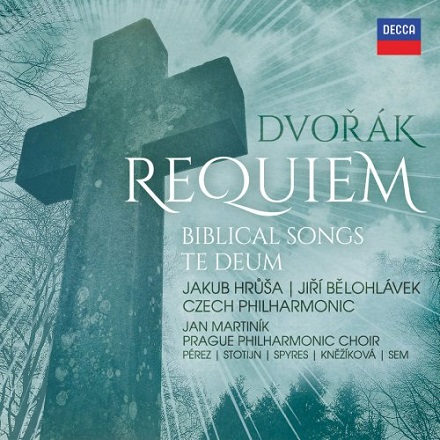Hrůša, a close associate of Bělohlávek, conducted the Czech Philharmonic’s memorial to Bělohlávek in September 2017 (Dvořák Stabat Mater). The performance of Dvořák Requiem on this recording was made in September 2017 at the start of the Dvořák Festival in Prague, also in honour of Bělohlávek. Although Bělohlávek himself was only able to record the Dvořák Biblical Songs op 99 (with another Bělohlávek regular, Jan Martinik) this recording is effectively a monument to Bělohlávek, and a worthy successor to the rest of the Decca series. Hrůša’s Requiem, capturing the full emotional intensity of that memorial concert in the Rudolfinium, Prague, where everyone on the platform and in the audience had personal knowledge of Bělohlávek and what he meant.
Requiems commemorate the dead, and for those who believe, encapsulate the central tenet of Christianity. Dvořák’s religious beliefs were profound, shaping his Requiem as a testament of faith. The Kyrie, by far the longest part of the first section, is a funeral march, the pace measured and dignified. The strings create a reverential hush, but one lit by luminous, transcendental light. This reflects the text: “Requiem aeternum dona eis, Domine, et lux perpetua luceat eis”. The promise of eternal light, even in the depths of anguish. “Kyrie eleison” thus has context. In the second Requiem aeternum, a solo emerges, and the pace picks up: lines pulsate, as if in anticipation.
The Dies Irae marks a transition: powerful chords underline a sense of violent change. A trumpet calls forth, the “tuba mirum spargens sonum” whose baleful sound heralds the Day of Wrath that marks the End of Time and the mass resurrection of all who have died. Thus, the tenor part, with its prayer-like intonation, and the fierce outbursts from choir and orchestra. The plaintive Quid sum miser states that mankind is weak, but salvation lies through “Rex tremendae majestis”. With the Recordare, Dvořák’s identity re-asserts itself in the loosely Bohemian personality inn the orchestral line, here highlighted by the sensitivity of Hrůša and this orchestra who understand it so well. The soloists, Michael Spyres, Jan Martinik, Ailyn Pérez and Christianne Stotjin form an ensemble like a garland. With the Confutatis maledictus and the Lacyrmosa, (particularly beautiful singing and playing) this constant interplay of turbulence and tenderness creates inner momentum, intensifying a sense of forward thrust.
This underlines the structure of this Requiem, the first part building up to the second. With the Offertum, the bass part, haloed by harps and choir, suggests depth and profundity, the female soloists and tenor enhancing this new mood of confidence. “Sed signifer sanctus Michael reporesentet eas in lucern sanctum”. Vigorous rhythms replace the funereal tread of the first Requiem Aeterum. the trumpet now introduces a Hostias where the soloists ring out pure and the chorus (Prague Philharmonic Choir) very well parted. With the Sanctus, yet another change. As this Requiem reaches its conclusion, its spirit transforms. Even the Pie Jesu is affirmative, multiple voices together welcoming Eternal Rest. This Agnus Dei is a wonder, the luminous textures of the first Requiem Aeternum now illuminating the singing and playing transcendent glory. Delicately paced diminuendos create the image of heavenly peace. Truly “lux perpetua luceat eis”. And truly Hrůša’s Dvořák Requiem truly establishes the significance of the piece in our appreciation of the composer himself.
Dvořák’s Biblical Songs op 103 enhance the impact of the Requiem. The songs set texts from the Book of Psalms. The vocal line is dignified, even austere, emphasising the enduring power of these verses which have inspired people for thousands of years. The orchestral line is restrained, letting the voice ring out with Biblical portent. Bělohlávek and the Czech Philharmonic have the Dvořák idiom in their genes, bringing out the distinctive rhythms and character, which enlivens this performance without dominating. I’m very much taken with Jan Martinik, whose voice has natural richness and colour, and delivers with understated power. He worked very closely with Bělohlávek and the Národní divadlo and regularly featured in Bělohlávek’s numerous concerts in London. Definitely a recommended recording, even though there is much competition.
In this performance of Dvořák’s Te Deum op 99 recorded by Hrůša in December 2018, the brass are bright and assertive, the rhythms confident and distinctively idiomatic. There are echoes of the composer’s ninth symphony, but it is essentially a celebratory showpiece for large orchestra and massed voices and presented here with great verve. The baritone is Svatopluk Sem, another Bělohlávek favourite and Národní divadlo regular, and the soprano is Kateřina Kněžíkov. Much is made of the high-profile premiere in 1892, but the sad truth is that Dvořák was never paid. When a cheque finally arrived, it failed to clear. Oddly enough that fits in with the idea of a Requiem. No matter what worldly status might bring, at the end we all end up the same so what you believe might make a difference.
Anne Ozorio
Please also see more about the Bělohlávek Decca series
Monumental Josef Suk : Asrael Symphony
Janáček Glagolitic Mass, Sinfonietta
Life-affirming Smetana Ma Vlast
Dvořák Stabat Mater
